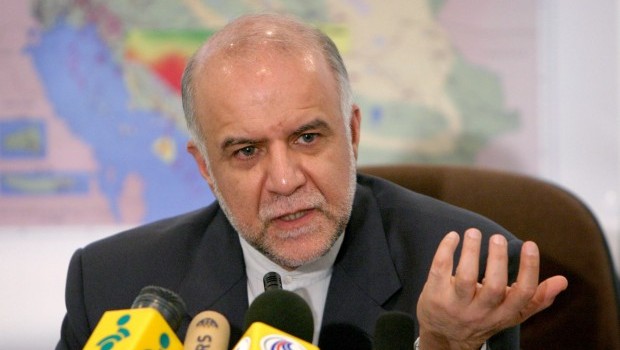
Iranian oil minister Bijan Zanganeh speaks during a news conference at the oil ministry in Tehran in this March 8, 2005, file photo. (REUTERS/Raheb Homavandi/Files)
London, Asharq Al-Awsat—The Iranian parliament has formed a “special working group” to investigate a USD 2-billion debt owed by a prominent Iranian businessman to the country’s oil ministry.
“The Energy Committee at the Iranian Parliament has been investigating the case since a long time ago,” Mousa Ahmadi, a committee member said on Wednesday.
Iranian Oil Minister Bijan Namadar Zanganeh said Tuesday that Iranian tycoon Babak Zanjani has not yet returned more than USD 2 billion of Iranian oil revenue that he was supposed to transfer back to state coffers.
According to Zanganeh, Zanjani claims that the US government has blocked his bank accounts outside Iran.
In an interview with the ISNA News Agency on September 1, Zanjani confirmed that he had been assisting the Iranian government sell oil abroad, as well helping Iranians to transfer billions of dollars from outside the country, in an effort to circumvent US sanctions on Iran’s oil exports and financial system.
Zanjani owns a holding company which consists of 64 firms, registered both inside and outside Iran. Some of the firms are reportedly used by Zanjani to handle oil-related payments.
He is considered a key facilitator for Iranian oil deals and the transfer of related funds, with his name appearing on both US and European Union blacklists.
According to the Council of the European Union, Babak Zanjani is known to have assisted certain entities to “violate the provisions of the EU regulations on Iran and provides financial support to the Iranian government.”
Zanjani says that the National Iranian Oil Company (NIOC) has exported millions of euros worth of oil products via his firms.
It is widely-believed in Iran that the Ahmadinejad administration pursued a policy of selling oil via quasi-private sector brokers in various international markets, mostly in south-east Asia, in order to evade oil sanctions.
These claims, as well as Iran’s other attempts to counter the embargo imposed by the UN, EU, and US on Iran’s oil sector during the Ahmadinejad administration have become a controversial issue within Iranian politics
Some figures close to former aides of ex-president Mahmoud Ahmadinejad have been named in Iranian media as Iran’s first ever oil tycoons. Babak Zanjani is the most infamous of the list, and is rumored to have made billions of dollars in proxy deals to sell Iran’s oil and import the hard currency earned in the deals back into the country.
In response, Iranian media reported that the country’s oil minister, Zanganeh, was tasked in August with creating a new organization to increase sales of Iranian oil and counter Western sanctions on Iranian oil exports.
Hamid Hosseini, a member of the Iranian Association of Oil and Gas Exporters, told reporters that the new body, suggested earlier by Zangeneh, “is to apply different procedures than the International Affairs Department at Iran’s National Oil Company, which currently holds the responsibility for selling Iran’s oil.”
The move to found the new organization also follows the passage of a bill designed to tighten sanctions on Iranian oil exports through the lower house of the US Congress in July.
